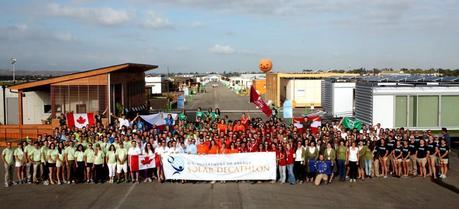 The Solar Decathlon 2013 teams join together for a group photo ahead of the start of competition at the Orange County Great Park in Irvine, CA on October 3, 2013 (Credit: Stefano Paltera/U.S. Department of Energy Solar Decathlon)
The Solar Decathlon 2013 teams join together for a group photo ahead of the start of competition at the Orange County Great Park in Irvine, CA on October 3, 2013 (Credit: Stefano Paltera/U.S. Department of Energy Solar Decathlon)Community-led energy projects are not taken seriously enough by the government, according to a new report from the University of East Anglia (UEA).
Published yesterday, the report looks at how initiatives such as community-owned solar panels, wind turbines and hydro-electricity generators, as well as energy-saving projects, could make big differences in tackling climate change.
But while a ‘Big Society’ ethos has formed part of the legislative program for the coalition government, and the UK Government’s new Community Energy Strategy has been a big step forward in terms of supporting the emerging sector, researchers say better policy support is still needed to get grassroots environmental projects off the ground.
The research team from UEA and the University of Sussex looked at 12 small-scale projects which aim to reduce energy consumption in local communities across the UK. These included a solar panel project in Brighton, an eco-home development in Bristol, hydro-electricity generation in Cumbria, and a community island buy-out on the Isle of Gigha in Scotland.
They also carried out interviews with the movers and shakers responsible for getting community-led projects off the ground.
Lead researcher Dr Gill Seyfang, from UEA’s school of Environmental Sciences, said: “The combined pressure of global climate change and threats to energy security mean that we will have to think more radically about sustainable energy. We wanted to know whether energy-saving community projects, run by voluntary organizations, schools, businesses and faith groups, could help.
“We looked at a variety of community energy projects—from community-owned renewable energy generation to energy efficiency projects such as refurbishing a village hall.
“We particularly wanted to know about the kind of knowledge, support and resources these projects needed to really thrive—and compared those needs to what is available to help projects get off the ground.
“What we found is that there is a great deal of community enthusiasm for small scale innovative projects like this, but the resources available are not always enough to really help them flourish.
“What is really needed is flexible and tailored policy support at all levels. While technical advice is available through handbooks and toolkits, there are some really critical support needs in particular—from decision making help to financial models and emotional stamina to keep going in challenging times.
“The Community Energy Strategy has adopted many of our recommendations for supporting mentoring and intermediary organizations, but much more still needs to be done. A huge priority is for government to recognize that many community energy projects are aiming to tackle fuel poverty and develop stronger communities, as well as generating or saving energy. Evaluation and performance monitoring really needs to value these different kinds of results, and not simply focus on the amounts of energy produced.
“Community energy has a part to play in a sustainable energy future for the UK, but demands joined-up policy support, spanning community development, social inclusion, regeneration, energy and climate change.”
Seyfang, G., Hielscher, S., Hargreaves, T., Martiskainen, M., & Smith, A. (2014). A grassroots sustainable energy niche? Reflections on community energy in the UK Environmental Innovation and Societal Transitions DOI: 10.1016/j.eist.2014.04.004
